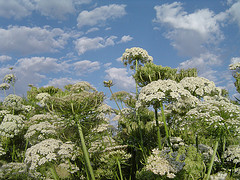
 In the Fall 2011 issue of Edible Madison, Melissa Hughes with Organic Valley discusses the illusive promise of GE technologies in her piece Searching for the Silver Bullet. The piece is well written, and highlights the need to look beyond silver bullets — including GE traits that do not provide long-term, sustainable solutions to the challenges at hand — and instead focus on holistic and ecologically based approaches to agriculture. We couldn’t agree more.
In the Fall 2011 issue of Edible Madison, Melissa Hughes with Organic Valley discusses the illusive promise of GE technologies in her piece Searching for the Silver Bullet. The piece is well written, and highlights the need to look beyond silver bullets — including GE traits that do not provide long-term, sustainable solutions to the challenges at hand — and instead focus on holistic and ecologically based approaches to agriculture. We couldn’t agree more.
But missing from the solutions discussion is this: Seed bred under organic conditions provide organic farmers with the optimum genetics for their production systems, tools necessary to handle resource depletion, climate change, and population growth. As discussed in the piece, these challenges require ongoing improvements in agriculture. These improvements must include investments in plant breeding to deliver beneficial traits that address these issues and others as they arise.
As we wrote in our State of Organic Seed report: Organic farming and organic seed systems are particularly suited to address these challenges in a scientifically integrated, socially ethical, and environmentally responsible manner. While the agricultural biotechnology sector invests in propaganda campaigns to promote traits such as herbicide tolerance as “sustainable,” we in the organic community have an opportunity to go beyond rhetoric and marketing to provide future generations with improved food, health, and environmental security. Organic research and breeding are in their infancy. With further investments we will see exponential improvements that recognize local ecological systems and address food consumer needs, such as regionally adapted seed varieties that are suitable to a range of growing seasons, resist important crop diseases, and have enhanced flavor and nutrition.
There are no silver bullets. But investing in organic plant breeding is vital to a secure food future. We can do our part by asking for investments from the farmers, seed companies, and food companies we source from, and from our lawmakers and regulatory agencies creating and enforcing agricultural policies (the next Farm Bill is not far away).
